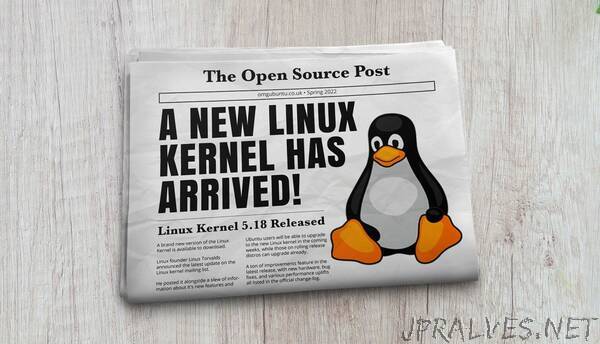
“Ahoy, a brand new Linux kernel release is now available to download.
Linus Torvalds, creator of Linux, announced the release of Linux 5.18 in a short email to the Linux Kernel Mailing List, writing: “No unexpected nasty surprises this last week, so here we go with the 5.18 release right on schedule”.
Ahh, I do approve of punctuality, monsieur Torvalds. Predictability and schedule makes writing these blog posts much easier—Wait, I’m lying: I always leave these posts until the last minute.
What’s new? Let’s find out together!
Linux 5.18 Features
Among the headline changes in Linux kernel 5.18 is the (somewhat controversial) inclusion of Intel Software Defined Silicon (SDSi) driver to the mainline kernel. This driver (to cut a long story short) restricts access to certain processor features if a certificate from Intel isn’t present.
Some fear SDSi is harbinger of a new business model whereby CPU functions are disabled until a user ‘pays’ for a license to ‘unlock’ them. Think in-app purchases, but for hardware you’ve bought; all capabilities are present, but they are disabled by default.
But as LWN’s Jonathan Corbet explains in an overview of the furore there are no technical reasons why the SDSi driver shouldn’t be included in the Linux kernel. On a code basis the implementation/support is no different to other drivers readily included, regardless of how Intel may use the features it provides down the line.
Plus, Intel is yet to make clear its plans for SDSi-enabled CPU features. For now at least, some of the worry is presumptive and (likely) a little overblown.
On the hardware front the Raspberry Pi Zero 2 W picks up full mainline Linux kernel support in this release (i.e., ‘out of the box’ it all just works); the Tesla FSD chip (a Samsung-based ARM SoC the company is using in its fully-self-driving cars) gets upstreamed; and there’s the usual batch of bring-up for newer AMD and Intel processors in development.
Driver tweaks to support a bunch of Razer Blackwidow keyboards that are not properly HID compliant; support for Imagis touchscreens; working ACPI profile support on AMD-powered ThinkPads; and further work to improve Apple Magic Keyboard support, including FN key mapping for the first-gen and 2015 models.
Other new features in Linux 5.18 include:
- New Hardware Feedback Interface (HFI) driver for Intel hybrid processors
- NUMA balancing scheduler updates for AMD EPYC servers
- AMD HSMP driver
- Various AMD nested virtualisation improvements
- Intel Idle driver support for Intel Xeon ‘Sapphire Rapids’ processors
- FreeSync enabled by default in AMDGPU driver
- Btrfs supports encoded I/O and faster fsync
- FN key mapping for MacBook Pros with touch bar
For more details you can refer to the Kernel Newbies page, LWN’s merge overviews (part 1, part 2), Phoronix’s feature rundown, as well as the raw source code itself (g’won, you know you want to).
Linux 5.18 will be available to install in rolling release distros shortly. The update will find its way into Pop!_OS at some point in the near future, inline with that distro’s policy of ensuring users get newer kernels more frequently than Ubuntu provides.”
